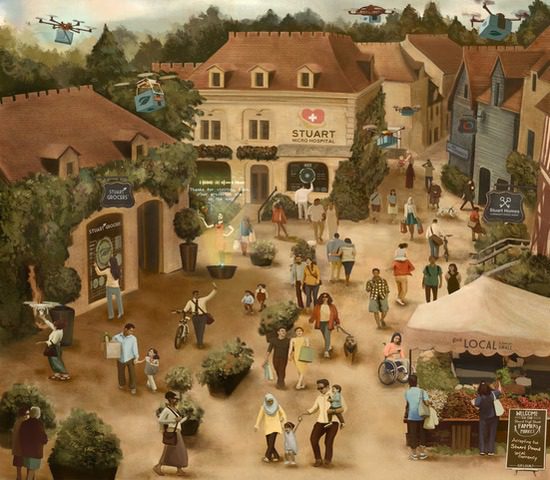Metro Bank publishes new independent report which predicts what the successful high street of tomorrow could look like, and it’s not what you may think
- Metro Bank has teamed up with Will Higham, Britain’s leading Consumer Futurist, to predict the future of the high street
- The ‘Back to the Future’ report explores what thriving high streets and local communities will look like in 20 years’ time – they’ll be just like those of 1640, but with a modern-tech twist
- Every chain store will have the neighbourhood’s name on its shopfront, customers will be recognised via Artificial Intelligence as they enter shops, drones will deliver goods and small businesses will even start to trade in local currency
- Over 90% of Brits think the world would be a nicer place if there were more face-to-face interactions
- Almost two thirds (64%)1 of Brits agree they would like to be on a first name basis with more of their local shopkeepers
- The full report can be viewed at https://www.metrobankonline.co.uk/about-us/research/back-to-the-future/
In order to save the Great British high street of the 21
st century, we need to go back in time and take inspiration from the 17
th century. Indeed, findings from a new report published today by Britain’s community bank,
Metro Bank and Britain’s leading Consumer Futurist, Will Higham, reveal the future of the high street actually lies 400 years in the past.
Far from the vision of a super futuristic, tech-heavy world, the report outlines that the desire for face-to-face contact and micro communities, which has been accelerated by the pandemic, will drive us towards a high street that mirrors that of the Stuart period in the 1600s – but paired with modern technology that takes the hyper local to new heights. The full report can be read
here.
Key outtakes from the report
Themed streets where everybody knows your name
Metro Bank’s ‘Back to the Future’ report reveals that in order to thrive again towns and cities will need to revert to those of the 1600s: which were a diverse collection of unique villages and micro high streets, with small shops set up in residential backstreets and alleys.
Every ‘village’ will have its own stores, all of which will include the name of the neighbourhood on their shopfronts. Shopkeepers – aided by subtle tech – will also get to know every customer by sight, including their name, in order to provide a more personalised experience. This is something that 64% of the public are keen to see happen.
As was the case centuries ago, many high streets will have their own distinctive commercial theme – one may be a thriving hub for jewellery, another for cycling gear. Inspired by Etsy and eBay, more of us will turn into artisans, selling goods and produce from honey to handmade hats out of our houses, door to door or in local makers’ markets. Micro-payment apps will allow the smallest trader to succeed. We’ll even drop our broken products round to skilled neighbours to repair, or lend our car out to neighbours via a locally run car club.
Swap economies and high street micro hospitals and factories
The desire to keep things hyper local will see the rise of micro-facilities on high streets including micro-hospitals operating out of houses (like the olden days) and micro-universities. Individual households will also take it in turns to represent the ‘village’ on the local Council.
Areas might trade in their own currency and offer discounts to those showing local ‘passports’. We’ll start to barter again, run swap meets for toys and clothes and take part in co-operative time banks or volunteer-run creches and have citizen-run estate agents. National retail chains will rent a space in giant ‘click and collect’ sites while supermarkets might create micro-stores specialising in goods appropriate to the local demographic.
E-Commerce will remove the need for local shops to have big inventories and instead they’ll thrive on curation, advice and sociability. Advances in 3D printing will enable each village to have its own micro-factories and workshops, with drones dropping off products to and from local stores and suppliers – something 42% of the public are keen to embrace.
Using artificial intelligence to foster real community bonds
Artificial Intelligence (AI) will enable all staff to keep an inventory of everything their customers do and want, helping to provide a genuine ‘personal service’ to each and every member of the public.
Alongside micro-cinemas on high streets showing locally-curated and filmed movies, some citizens will take advantage of their high-tech surround-sound home cinema set-ups, charging people to watch the latest film, and messaging services like WhatsApp will act like bulletin boards with makers letting customers know when a new batch of goods is in. The community will get together to paint murals on local walls and hyper-local sports will rival national sports, with local football, tennis and basketball leagues attracting big crowds.
Leading Consumer Futurist Will Higham comments on the report findings, “Britons’ renewed love of community is one of the biggest trends we’ve seen in the last ten years, especially with the boost it’s been given by lockdown. And anxiety around our globalised world is making Britons look back at the way communities used to live with renewed interest. That’s true of young and old alike.
“Check out how well vinyl records and board games are selling with Gen Z. It’s not a luddite rejection of technology though. As the report shows, innovations like AI and e-commerce can actually help bring communities closer together. Building a bright future for the local high street will be about combining the best of the present with the best from centuries past.”
To accompany the Back to the Future report, Metro Bank also commissioned research with the public to understand if these changes would be welcome. Surprisingly, from a generation who spend a vast amount of time interacting via technology, over half (61%) of 16-24 year olds reveal they would like stores to know their name. 67% of those over the age of 55 would also like to be on first name terms with more of their local stores and like the idea of a community-first high street.
Over 90% of Brits (one in four (83%) 16-24 year olds) think the world would be a nicer place if there were more face-to-face interactions, with almost half (49%) saying lockdown has made them take more interest in their local community. One in five (20%) now volunteer in their local area and 66% are open to start contributing their skills and free time to help others.
Kat Robinson, customer experience director from Metro Bank adds, “Community has always been at the heart of Metro Bank so it’s very reassuring to see that the future of the high street is going to be very much centred around just that. The fact that nine out of ten Britons want more face to face interactions reflects what we see every day in our business – customers want a real person to talk to – especially when they are making big decisions about key moments in their life such as taking out their first mortgage.
“It appears we’ve already taken steps in the right direction by supporting small start-ups and entrepreneurs and by having business managers at each of our stores who are solely focussed on helping local businesses. We also let business customers use the store’s meeting facilities, free of charge.”
The report findings prove that even with technology driving a lot of what’s to come in the future, it’s people who shape our local communities. People form the bedrock of our business and we’re committed to ensuring that remains the case for decades to come.”
Help keep news FREE for our readers
Supporting your local community newspaper/online news outlet is crucial now more than ever. If you believe in independent journalism, then consider making a valuable contribution by making a one-time or monthly donation. We operate in rural areas where providing unbiased news can be challenging. Read More About Supporting The West Wales Chronicle

























